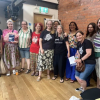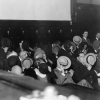What a nauseating display.
Filed under “Transgender News”:
Brighton & Hove City Council councillor Alison Thomson, of Brighton & Hove Labour Party, has apologised for engaging with transphobic posts on social media, as reported by Scene magazine. The Labour councillor was slammed by community groups for reposting or liking a series of tweets supporting the anti-trans TERF movement, which is spearheaded by controversial figures such as JK Rowling and Julie Bindel.
Millions of womenphobic “posts on social media” appear every day without any male reporters getting all breathless about it, let alone openly fantasizing about women getting “slammed” for likecrime.
The councillor said in her apology:
“I apologise unreservedly for endorsing these social media posts which contain anti-trans sentiments.
“I recognise that they are offensive to the transgender community and I am deeply sorry for the hurt caused by this.
“I am committed to undergoing training to better understand the lived experiences of transgender people and with the aim of becoming a good trans ally.”
In other words the councillor is a hostage.
For the billionth time I point out that nobody has ever talked this way about the torrent of sexist and misogynist garbage on social media. It’s just normal to express hatred and contempt for women, and women just have to put up with it. Men in skirts, on the other hand, are as fragile as morning mist and must be shielded and pampered and love-bombed every minute of every day. People must undergo training in how to flatter them enough, while noisy haters of women just get noisier.
Leader of Brighton & Hove City Council and Labour Group, Bella Sankey added: “We know that Brighton & Hove is a beacon city for trans, non-binary, gender queer and lesbian, gay and bisexual communities. People come to our city because we are known as a safe and inclusive city with a thriving diverse and intersectional population.
Brighton is neither safe nor inclusive. Brighton is hostile territory for women.
“As your Labour Council, we stand in solidarity with our trans, non-binary and intersex communities and are proud of our commitment for trans equality and we celebrate our city’s diversity.
“I want to reassure the trans community that any expressions of anti-trans sentiment in any form will not be tolerated.
“Councillor Thomson has now, rightly, apologised unreservedly for her actions. I have also taken the decision to remove Cllr Thomson from her lead role on City Centre Renewal, while further investigation is carried out and subject to her completing training.”
Diversity blah blah anti-trans sentiment blah blah women councillors are so much garbage to be ground up at the pleasure of our trans, non-binary and intersex communities.




